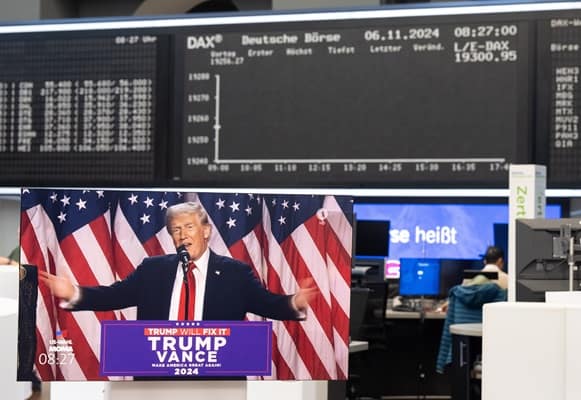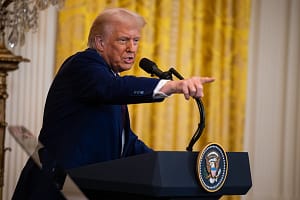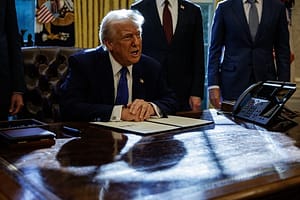Are Trump’s tariffs and threats an opportunity for UK?
By deVere Group’s Investment Director James Green
US President Donald Trump’s tariff policies are reshaping global trade. While he has agreed to pause 25% tariffs on imports from Mexico and Canada for 30 days, China has not been spared, facing 10% tariffs and responding with its own retaliatory measures. The European Union is also under threat, with Trump stating that tariffs on the bloc “will definitely happen.”
In this volatile and rapidly evolving climate, the UK could find itself in a unique position to turn these disruptions into opportunities.
Services-based economy
Tariffs tend to hit goods-heavy economies, such as those of Germany and China the hardest. Britain’s economy, by contrast, is largely based on services, such as finance and consulting—sectors that are not as directly affected by tariffs.
This could give Britain some insulation from trade shocks affecting other European nations. The country’s focus on high-value industries like pharmaceuticals and aerospace, which rely more on intellectual property and innovation than raw materials, further reduces its exposure.
A safe haven for investment?
Trade tensions often create uncertainty, leading investors to seek stability. If Trump’s tariffs destabilise Europe, the UK might attract capital flows, strengthening the pound and reinforcing London’s position as a key financial hub.
The recent confirmation of US tariffs sent the pound higher against the euro and other major currencies, suggesting that investors see Britain as a relative safe haven in this regard.
The resilience of the UK’s financial sector could prove crucial in drawing in global capital, particularly as multinational firms seek to hedge against uncertainty in their home markets.
Additionally, the UK’s longstanding reputation for regulatory stability and deep capital markets make it a preferred destination for institutional investors.
Should tariffs weaken EU economies, firms looking to move assets away from uncertainty could turn to Britain as an alternative, strengthening its role as a global financial centre. As such, this would then support higher foreign direct investment levels, encouraging economic growth despite external pressures.
Brexit and trade policy
Brexit allows the UK to negotiate trade deals independently of the EU, which could be an advantage if Trump imposes stricter tariffs on European nations. A well-crafted trade deal with the US, if achievable, might give British exporters an edge in sectors such as pharmaceuticals, aerospace, and automotive.
With the EU locked in a tariff battle, UK businesses may find themselves uniquely positioned to offer American buyers tariff-free alternatives.
A key factor will be how quickly and effectively the UK government secures preferential agreements. By acting swiftly, Britain could negotiate exemptions from US tariffs, unlike its European counterparts.
If successful, this could open new opportunities for exporters and make the UK a more attractive partner for US-based businesses looking to avoid tariffs.
Global supply chains
Trade wars often lead businesses to reconsider their supply chains. If the EU faces US tariffs and Britain remains exempt, UK firms might serve as intermediaries, helping to facilitate transatlantic trade. This could enhance Britain’s role in global commerce, though it remains uncertain how much of a boost this would provide.
The impact would be particularly pronounced in industries reliant on complex supply chains, such as aerospace and pharmaceuticals. Britain’s status as a major hub for professional and financial services could further cement its role in facilitating rerouted trade flows.
To make the most of all these possibilities, the UK would need to take decisive policy actions. Strengthening trade relationships, offering investment incentives, and maintaining regulatory stability would be essential to attracting businesses seeking new trade routes and financial hubs.
Policymakers should also focus on expanding trade relationships beyond the US to ensure long-term resilience, capitalising on growth markets in Asia and the Middle East, as well as improving and enhancing our relationship with partners in Europe.
With the right strategic approach, Britain could capitalise on the evolving trade landscape, positioning itself as a key intermediary in global commerce.
But whether the UK emerges as a winner will depend on its ability to negotiate effectively, attract investment, and adapt.






Leave a Comment